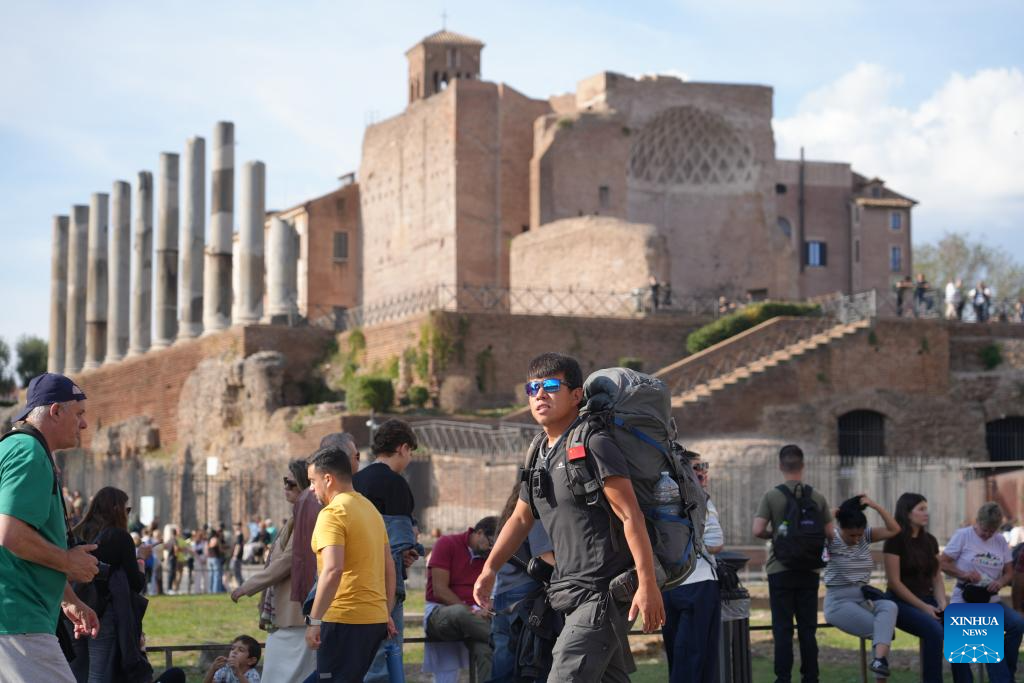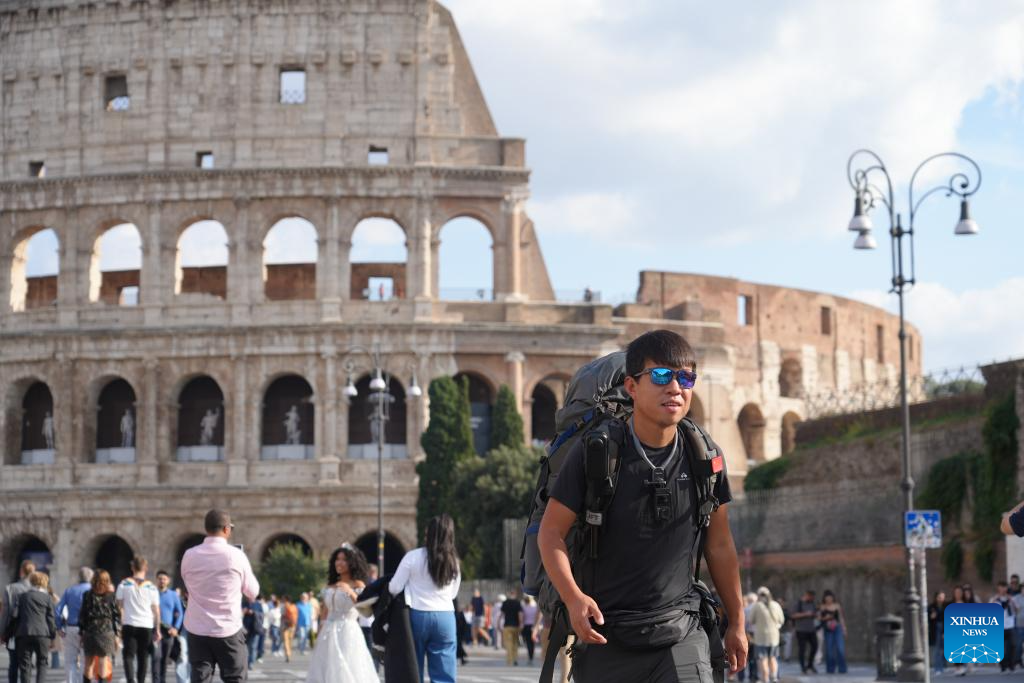Feature: From Xi'an to Rome on foot, one man's journey along the modern Silk Road
Source: Xinhua
Editor: huaxia
2025-10-25 03:40:15

Chinese traveler on foot Cheng Long visits Palatine Hill in Rome, Italy, Oct. 19, 2025. (Xinhua/Ren Yaoting)
By Xinhua Writer Ren Yaoting
ROME, Oct. 24 (Xinhua) -- Under the autumn sun, 34-year-old Cheng Long stood before the Colosseum in Rome, Italy, a battered rucksack at his feet. In a plain blue T-shirt, skin browned, and hair tousled by wind, he looked every bit the itinerant traveler -- and the endpoint of a two-year walk that began in China's Xi'an and traced the modern echoes of the ancient Silk Road across Eurasia.
"I tried to find beautiful words, but none fit," Cheng told his livestream audience upon reaching Rome. For two hours he wept on camera, as exhaustion, relief and pride merged into one.
A CHILD DREAM SET IN MOTION
Cheng grew up in northwest China's Shaanxi Province, a land steeped in tales of ancient caravans and faraway markets. Raised in a city near Xi'an - the former capital of several Chinese dynasties - he was fascinated by historical dramas, particularly the scene in The Prince of Han Dynasty where Emperor Wu dispatches envoy Zhang Qian to the West over 2,100 years ago, opening a route of enduring friendship and exchange between China and the Western Regions. That moment planted a seed in his heart - one that would one day lead him across continents.
He did not set out unprepared. Cheng ran half-marathons several times a week to build endurance and trained regularly in the Qinling Mountains. At 23, he completed a 3-month-long trek along the 2,000-km-plus route from Sichuan to the Xizang Autonomous Region. Standing before the Potala Palace in Lhasa, he felt that another, greater limit needed to be tested.
Life between jobs -- clerical work, outdoor gear sales, odd engineering projects -- allowed him to save, but it was a personal reckoning that finally sent him on his way. After nearly a year caring for his seriously ill mother, Cheng began to wonder whether life should be measured by its length or by its meaning.
In spring 2023, with his mother's health stabilizing, he sold his car, packed a few changes of clothes, a small sum of savings, a national flag, and his phone, and set off at age 33.
He called his TikTok account "Dragon Walker." When he began, he had around 8,000 followers on Chinese social media. By the time he reached Rome, that number had swelled to nearly 300,000.
ROAD AND TRIAL
Cheng's route took him from Xi'an, through Horgos Port in northwest China's Xinjiang Uygur Autonomous Region, into Kazakhstan and the Central Asian republics, across the Caucasus and Türkiye, and onward to Greece and finally Italy. He covered more than 10,000 km, enduring deserts and mountain passes where temperatures swung from scorching heat to freezing cold.
The road left its mark. He wore out 19 pairs of shoes, broke two backpacks, and saw a homemade cart collapse more than once. Blisters became calluses, and a torn meniscus in his left knee nearly ended the journey.
There were moments of real danger. In Kazakhstan, he collapsed from a 50-degree heat and woke up in a small-town clinic, tended by strangers. "That was the closest I've ever come to death," he recalled.
Money was a constant worry. As his savings ran low and costs rose in Europe, he turned to his growing online audience, livestreaming sections of his trek and accepting modest donations. In remote areas, unstable internet made streaming difficult, and sometimes a handful of encouraging messages meant the difference between eating or going hungry. "At first, I resisted taking money, he said softly. "But when you have to keep moving, you accept help. I would not have finished without it."
He learned to adapt: to care for his health, to maintain hygiene, to tend wounds, and to rest when fatigue demanded. He improvised constantly. When he could not carry on alone, strangers offered shelter, food or a ride.
In Italy, after a night with nowhere to stay, a local butcher let him camp in the family yard, then brought him coffee and dried meat the next morning -- a small kindness that lingered in his memory.
WHAT THE ROAD REVEALS
Cheng's walk was more than a personal trial: it was a journey through the living geography of a remade Silk Road. Along the way, he saw new infrastructure, Chinese-made cars in Central Asian towns, and digital commerce reaching unexpected corners.
Where caravans once carried silk and spices, today highways, railways, and fiber-optic cables connect East and West. "The Silk Road I traveled this time is very different from the one I learned about as a child - now it is built of steel and fiber - yet the spirit of human exchange endures," he said.
One of his most-watched videos showed a Chinese crew building a road in Georgia. Seeing compatriots abroad filled him with pride and a sense of how fast Eurasia was changing. He kept a small Chinese flag on his pack, unfolding it for photos in each country, a ritual that, he said, kept the thread of home alive as the miles grew.
What moved him most, though, was human kindness. Language and faith differed, but hospitality did not. Desert medics, farmers, shopkeepers and passersby offered food, shelter, or aid. Simple acts often determined whether he would continue the next day. "Kindness is a common language," he reflected.
Many of his followers say Cheng's journey changed how they see their own dreams -- showing that beginning matters more than expectation. Cheng plans to fly home for a short rest before setting out again by vehicle to revisit those who helped him and to record their stories.
He said that his journey shows that even in the 21st century, the Silk Road still connects people, through shared paths, shared labor, and shared compassion. "The important thing," he told his followers, "is not to wait for the perfect moment. Take the first step." ■

Chinese traveler on foot Cheng Long walks past the Colosseum in Rome, Italy, Oct. 19, 2025. (Xinhua/Ren Yaoting)



